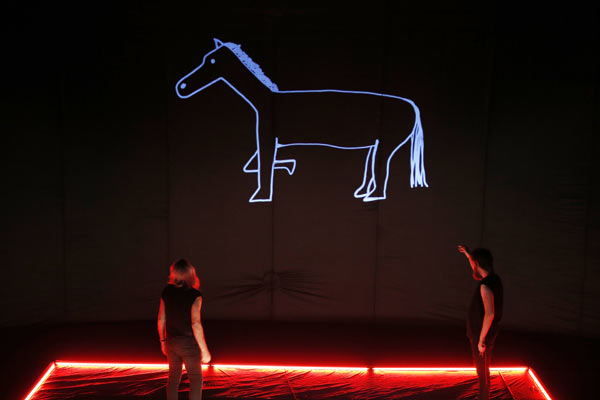This month, Director Bruce Gladwin and his crew at Back to Back Theatre present an unusual play that showcases and celebrates death.
The play's title 'Lady Eats Apple' is all too appropriate, with the everlasting metaphor of the power of knowledge, after Eve makes the first mistake of eating the forbidden fruit.
The stage is recreated in an inflatable realm filled with oxygen to mimic the near-death experience. Bruce describes the performance being in three short works which is the creation and destruction of each set of works one after the other… So what is it really about you ask?
“The form of it is also about death, the cycle of creation and destruction,” Bruce says. There was a lot of effort put into the research of the play and a number of people that Bruce and his team spoke to, had some very interesting near death experiences.  Image © Jeff Busby
Image © Jeff Busby
“Part of our research into the making of the work is that we spoke to a number of people that had a near death experience, so they [had] approached clinical or were nearing clinical death and then had an experience that had spiritual significance for them or not,” Bruce says. “I guess the form of what the show looks like is, it’s formed a lot by peoples' description of the articulation of what they experience when they were losing oxygen to the brain and what the process of dying to them was like.”
Bruce specialises in the development of theatrical work as a writer, designer and director with a group called Back to Back Theatre. It was Bruce’s colleague Simon who had a burning desire to explore a tragedy and create a production. For Bruce, the play definitely played a significance in his life after losing both his parents a couple of years ago, and the play was a way for him to personally understand death in his own life.
“Death is something that is kind of imposed on us all through our lives…The question is what meaning can we take from it?” Bruce says. “There’s also moments of the work that are very funny and light, and it’s not like going to a funeral by any means… I think about myself reading a description of the show and going ‘would I go and see it myself? would I go and see a work about death?', maybe I wouldn’t be reluctant too, I don’t know, would you?”
It’s an interesting question to ask yourself. Bruce says that people are more likely to watch a show about immortality, because of the stigma attached to death, but it also has another message behind it.
“We were just doing a line run for the show just before. There’s a point in the story, the first act deals with two Gods in this discussion and the second act is dealing with the near death experience,” Bruce says.
The final act is a group of cleaners who are cleaning the theatre where the show takes place, the power struggle between the cleaners and their supervisor.
“But it’s really a story about sex and I guess that’s the other book end idea of death... When it comes in the story in the play it’s kind of like a huge relief that there’s two characters that are quite sexually charged and it provides this kind of antidote to the weight of the discourse around death,” Bruce says. “I really like that moment because in a way it’s a balance to the other aspects of the story or stories.”
'Lady Eats Apple' plays at Carriageworks from 16-18 March.


